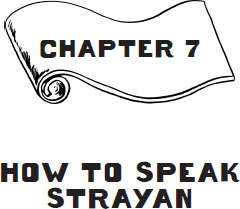
NOW, THOSE OF you who’ve been paying attention to all things Khatchadorian will know that, when it comes to Australia, I’m pretty much an expert. I’ve been there, like, THREE times. I’ve had some mega-great, awesome times in Oz and met a bunch of totally cool people—in fact, one of them was about to come visit me (more on that later)—but I’ve also had a few less good things happen Down Under. For instance, there was that time I got chased out of the country by a pack of bloodthirsty zombies, and that other time I broke my leg, not to mention the time I stood on a crocodile and—wait, you can go read all about it for yourselves. Trust me, a lot of Khatchadorian-related stuff went down Down Under, so when I hear the word “Australia”, or meet an actual Australian, my response is … complex.
But, whatever my feelings are about Oz, one thing was for sure: I had the Australian language nailed.
I know you’re thinking:

*Buzzer sounds*
UHHH, NUUUH!
Wrong.
Australians don’t speak English. They speak a little known language called Strayan. To talk Strayan, there are some rules you have to follow. They’re pretty simple rules (just like most Aussies … ha-ha, only kidding). Gulp.

1. Always shorten a word and add “-o” or “-ies” or “-ey” to the end. So “ambulance” becomes “ambo”, “service station” becomes “servo”. Geddit? Your “relatives” are “rellies”, and “mosquitoes” are “mozzies”. A “fireman” is a “firey”, and a “kangaroo” is a “roo”. Wait, that doesn’t fit …
2. “Mate” can be added to the end of any sentence. As in “Can you grab me a sausage, mate?”, or “Prime Minister, when are you calling the next election, mate?” Note: your “mate” can be everyone and anyone, from your gran to a total stranger. It’s not unheard of for an Aussie to call the Queen of England “mate”.

3. If you draw out the “a” in “mate”, it can be used as a kind of thank-you or warning. So if your friend buys you a ticket to the movies, you can thank her with a smile and a “Maaaaaate!” If your friend tells you he’s going to try to swim across a crocodile-infested river while wearing a suit made of raw meat, you can warn him with the exact same word but said while frowning.

4. Words can run into one another, like cars in a low-speed traffic accident. “Go on” becomes “gwan”, “Good on you” turns into “Gudonya”, and so on.
There are a lot more rules, but you get the idea.
So, when Hills Village’s only hipster spoke to me, I knew exactly what he was saying. “Howzit gwan, mite?” translates to “How are things going with you, my friend?”
“All good,” I replied, “mate.” See, I was straight in there speaking fluent Strayan, like I’d just stepped off a plane from Sydney.
The hipster paused and looked at me more closely. “You’re not Strayan, are ya?”
“No, mate,” I replied. “But I’ve been a few times, mate. Love it, mate.”
Okay, I admit I was overdoing it, but the hipster looked impressed. He stuck out a paint-spattered hand.
“Good to meet ya, fella! Put ya paw right there! Sid’s the name. Sidney Harberbridge.”
I blinked.
Sidney Harberbridge? Did he think I was born yesterday? Sidney Harberbridge as in THE Sydney Harbor Bridge?
“Yeah, mate,” the hipster said. “I know you’re thinking: What kind of a name is that?”
“No, I wasn’t. I didn’t. I mean, hey, like, whatever,” I burbled. I do that a lot—burble—when I get embarrassed.
“My folks musta had a sense of humor, hey?” He waved a hand at the sign. “Whaddya think?”
“It’s Aussie for ‘good on you’, right?” I said. “What are you selling? The coffee makes sense, but where does vinyl and yoga come into it?”
Sid grinned. “Glad you asked, mate! Lemme show ya,” he said, swinging open the front door. “This joint is sick!”
I stepped into Gudonya. If only I’d known that things would never be quite the same again (or at least not until the end of this story).